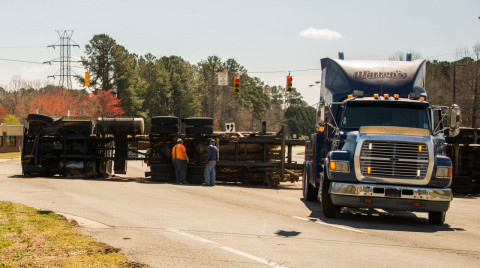Legal Blog
Truck Accident Laws and the Rise of Black Boxes
Truckers log over 200 billion miles per year in the United States alone. And being on the road so often means that there's a higher risk for truckers to be in accidents. Large and deadly, trucking accidents can cause serious injuries or deaths.
For the owners of the rigs, this can also mean hefty lawsuits, bad press and liability issues.
Trucking laws are similar to regular auto laws, but there are federal and state laws that must be followed by all truckers and all trucking companies.
Black Boxes Help Add ClarityBlack boxes and dashcams are being used extensively in commercial vehicles as a way to alleviate fraudulent liability claims. Black box data is similar to the black boxes in an airplane.
What these boxes do is monitor driving habits of the trucker, ensuring that the trucker is operating the vehicle efficiently.
"A crash victim may be able to use the black box data to prove fault," suggests Bradshaw Law LLC.
Black boxes offer:
- Speed data
- Braking frequency
Other vital data may be logged, but these two data points will be able to determine if the trucker was speeding at the time of the accident and if the trucker reacted properly before the accident.
Perhaps the trucker claims that they slowed down at the stop sign, but data from right before the crash shows that the trucker did not apply the brakes.
Federal Laws Need ConsiderationState and federal laws must be followed, and the Department of Transportation and the Federal Motor Carrier Safety Administration are the two governing bodies to be concerned about. Truckers and lawyers must adhere to the laws that the federal and state officials pass.
From a legal perspective, all of the following will be considered when fighting for or against a trucking accident claim:
- Rest. Strict laws are in place that require truckers to now rest after a certain period of time. "Hours of service" negligence may mean that the trucker surpassed the legal amount of time allowed to drive without rest leading to reckless driving.
- Licensing. Truckers are required to obtain and maintain a commercial driver's license. if this license is not valid or isn't present, the trucker and the company that he or she works for can be held liable for the accident.
- Weight. Strict limits on weight and the size of the vehicle are in place. Single axle vehicles can carry a maximum of 20,000 pounds, but a two-axle truck can hold 34,000 pounds. Overloading a vehicle may lead to slower response time and result in an accident.
- Quality. Trucks must be properly maintained, and a lawyer will look at the truck's repair records and state where the accident occurred. If the vehicle wasn't maintained properly or defect existed, this may result in product liability claim.
Lawyers and anyone that is involved in a trucking accident will need to use all of this information as a means to determine who is at fault for the accident. Of course, witness statements and videos, along with police reports, will also be used to determine fault in a trucking accident.
When you subscribe to the blog, we will send you an e-mail when there are new updates on the site so you wouldn't miss them.


Comments